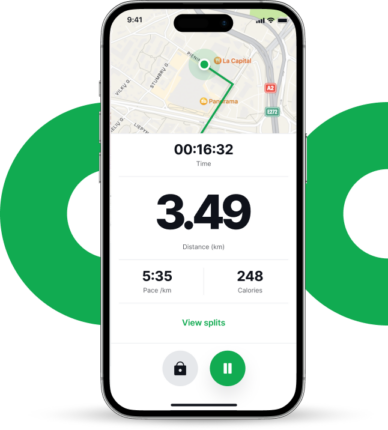Are you a running enthusiast? You may feel like running every day, especially if you’re training for a 5K or longer event. But is it healthy? Before you rack up the miles, you want to read this.
According to a review by the British Journal of Sports Medicine, running frequently can reduce the risk of all-cause mortality by as much as 30%. This is especially true for those who trade the couch for running shoes.
However, researchers noted that while running at least once a week is beneficial, higher doses of running don’t boost longevity benefits. What’s more, running every day, especially over long distances and at intense paces, can increase your injury risk.
This particularly applies to beginners. As a new runner, you may push yourself too much too fast, but as we’ll see, that’s not a good idea.
Whether you are new to running or a veteran, this guide will help you decide whether running every day is for you to optimize your training and workouts. Let’s dive in!
In This Article
In This Article:
Is It Safe to Run Every Day?
Running is a high-impact exercise that, if overdone, can lead to injuries like muscle tears, shin splints, or plantar fasciitis.
To avoid these overuse injuries, give your body time to rest. Switch high-intensity exercise for recovery runs or simply take rest days. According to research, slower pace runs of up to 10 minutes are highly beneficial, offering significant reduction of the risks of stroke and heart disease.
Interestingly, running more than 4.5 hours a week doesn’t add extra health benefits. So, running daily is safe if it’s moderate and short to prevent overtraining and injuries. You don’t have to run excessively to enjoy its health benefits.
Benefits of Running Every Day
Although extensive daily training might not be the best idea to improve your performance, running up to five days a week can benefit your health. Let’s see what science has to say about it.
Enhanced cardiovascular health
Another study that monitored runners for 15 years found that persistent runners had a 50% lower risk of cardiovascular diseases. Since running gets your heart pumping, the intake of oxygen increases, thus helping the cardiovascular system perform its job easier.
All in all, running makes for an excellent aerobic activity!
Increased weight loss
Running is one of the most effective exercises to burn calories, and a healthy way to lose weight. You’ll have to combine it with a healthy diet and keep on at it – results don’t appear overnight!
Also, did you know that even running a mile a day could help you shed some pounds over time? That’s because it burns 35 more calories than walking over a similar distance.
Improved mental health
Running regularly offers a range of mental benefits. Beyond triggering the release of mood-enhancing endorphins and endocannabinoids, it also acts as a powerful stress-reliever. Furthermore, running can sharpen your focus, enhance your working memory, and increase self-confidence.
You can maximize the mental health benefits by running outdoors in a pleasant setting and fresh air, such as a trail further away from cars, pollution, and noise. But even jogging through a bustling city carries its perks, depending on your preferences.
Need a little motivation to start? Try a running app like Joggo. It will create your running plan around your current fitness level, needs, and goals. Plus, you’ll be audio guided by a friendly running coach and get smart tips to help you level up.
Increased muscular strength and endurance
Running is also a great way to build muscle and increase your endurance. Engaging multiple muscle groups, especially in your leg muscles and core, running stimulates those muscle fibers and triggers protein synthesis.
Over time, these muscular gains counteract the natural muscle atrophy that comes with aging. That way, regular running not only improves your performance but also your day-to-day activities.
Reduced mortality risk
As mentioned previously, running for brief intervals every day can reduce your risk of suffering a heart attack, stroke, or premature death.
The Running as a Key Lifestyle Medicine for Longevity report cited above mentions that runners have a 25–40% lower risk of dying prematurely. What’s more, running can increase your longevity by approximately 3 years.
To maximize the longevity benefits of running, another study recommends running 2.5 hours a week or 30 minutes five days a week.
Improved lung health
Running can maximize your oxygen intake and increase lung function. It’s one of the best ways to keep your lungs healthy. Ideally, you want to avoid running in polluted areas, such as on the side of the road downtown.
And don’t forget the benefits it carries for your heart performance!
Better flexibility and joint strength
Moderate running and other workouts you may perform in conjunction with it, such as stretching, can improve your flexibility and joint strength. This can reduce your risk of injury and keep your joints in better shape.
Improved sleep
Running can de-stress you, promoting better sleep. Research carried on individuals with sleeping problems found that a 6-week aerobic workout program added 75 minutes to their nightly sleep. That’s more than what sleep medications can do.
Also, a study on adolescents running for 30 minutes every weekday for three weeks at a moderate pace noted improvements in sleep, concentration, and mood.
What Does Running Every Day Do to Your Body?
Running often is super healthy, that much is clear. But if you don’t adjust your effort and push yourself too hard, running daily can result in injuries and other unpleasant side effects.
Running daily for a month without rest periods in between runs is more likely to give rise to these issues. Let’s take a closer look at some of the common side effects of everyday running.
Runner’s knee
When the miles start adding up, you may experience dull pain around the front of the knee – a condition called runner’s knee. And having a high body weight can increase the risk as well.
Research indicates that moderate running with rest periods in between doesn’t injure your joints, so make sure to make pauses once in a while if you still prefer frequent training.
Black toenails
Running daily could make your toenails turn blue and black. This happens because you’re putting a lot of stress on your toenails.
A running routine of daily 5K could even mean losing a few toenails. Ouch!
Tip: Wearing a good pair of running shoes can make running easier on your toes.
Chafing
Chafing is another common consequence of running a lot. It happens when your moist skin rubs against your clothes.
It’s more likely to happen in hot weather, especially if you’re not using close-fitting running clothes. Lubrication can help reduce the risk.
Overactive bladder
A medical condition, an overactive bladder, can occur when repeated pressure is put on the bladder. It can happen when you run for miles.
Having to stay hydrated during long runs, which means taking in extra fluids, can contribute to the problem. This condition is more common in women who have given birth because pregnancy may cause muscles in the pelvic region to weaken.
Stomach issues
As you run, the bouncing motion of your body can push food through the digestive system faster than usual. At the same time, less blood reaches your intestines as it’s diverted to your running muscles.
Stomach problems, including cramps and nausea, can be the result of poor hydration. But they may also be brought on by drinking too much water or eating before your run.
How to Run Every Day
We’ve seen that running every day is not necessary to reap health benefits. It’s good to include a rest day in your fitness routine. Still, if you want to increase the number of runs a week, you can do so by gradually building up your endurance.
How much you should run depends on your level and goals, but it’s good to start small with 10 to 30 minutes of running.
Time your runs, test your running plan, assess your condition, and step it up if it feels comfortable. Here are some key things to pay attention to.
Control the controllable
Work on cadence and proper form, as these are within your control. Focusing on them will make it easier to stick through with your running goals.
Make sure you wear proper running shoes. You may be fond of that 5-year-old pair of sneakers in your closet, but they just won’t do if you want to run often.
And did you know that high-tempo music can boost your exercise? Music can influence your rate of perceived exertion. So, grab your headphones and move to the rhythm of a running music playlist.
On days when you can’t run outside because of bad weather, run on a treadmill if you can. A gym membership can be a great investment for a runner.
And, of course, make the most of your rest days. Eat healthily, take a supplement if you need to replenish key nutrients, and get proper sleep. It will help prevent injury and ensure you tackle those runs with motivation.
Have a weekly plan
Organizing your exercise routine into a weekly plan can pave the way for more efficient running. It’s not just about running daily – it’s about creating a balanced regimen that includes a mix of anaerobic activities and rest days.
Write down the days you are going to run. According to a study, 91% of people who tried this approach were successful in achieving their fitness goals. Then, gradually increase the number of running days as you get stronger.
Joggo can make this easier for you by personalizing a running plan that aligns with your level and goals. Besides, the app takes care of the balance, suggesting when to add hill repeats for intensity, walk-run sessions for endurance, or rest days for recovery.
Remember, it’s essential to incorporate strength training in your plan. Aerobic exercises alone won’t sufficiently build muscle, which is vital for becoming a stronger runner and minimizing injury risks.
Put safety first
Don’t forget about safety. Wear bright colors when running to make it easier for those in traffic to see you.
While exploring new locations can be fun, it’s best to look for well-lit trails or running paths if you run on your own.
Let someone know where you are, especially when going on a longer run.
Do pre-run workouts
Last but not least, include pre-run workouts in your running routine. More than preparing you for a run, these will reduce your risk of injury and contribute to building your overall fitness.
Start with basic stretching before a run. Then, focus on your lower body muscles – including walking glute stretches, walking lunges, single-leg squats, and other easy exercises you enjoy doing.
FAQ
How long should I run every day?
The duration of your daily run can vary based on your fitness level and goals. Moderate-paced runs of up to 10 minutes are highly beneficial, helping to reduce risks of stroke and cardiovascular disease.
If you’re aiming to maximize longevity benefits, running 30 minutes five days a week is a good benchmark.
How many miles should I run every day?
While miles can be a useful metric, the focus should ideally be on the time spent running rather than the distance covered.
Running for moderate durations is sufficient for achieving various health benefits. Overdoing it, especially for beginners, could result in injuries like shin splints and muscle tears.
Is running every day effective for weight loss?
Yes, running is an effective aerobic exercise for weight loss as it burns more calories than many other activities. However, running every single day, especially for extended periods, can increase the risk of injury.
For effective weight loss, consistency is key, alongside a balanced regimen that includes rest days and a healthy diet. Running apps like Joggo can offer you a well-rounded plan that incorporates your weight loss goals, ensuring that you run the right amount without risk of injury.
Can you get fit by running every day?
Absolutely, running offers many benefits for your health, including improved cardiovascular health, muscular strength, and mental well-being. However, moderation and rest days are important to prevent overuse injuries and complications.
The bottom line is that you don’t need to run every day to get fit. Running up to five days a week is often sufficient to reap most health benefits. You can also add some cross-training days to switch up your running routine.
Is it bad to run everyday?
There are undoubtedly some benefits of running every day. However, if done incorrectly or with too much intensity, it can increase the risk of overuse injuries such as muscle tears and shin splints. Your body needs time to recover between runs to perform at its best.
Additionally, running more than 4.5 hours a week doesn’t provide extra health benefits. Moderation is key to maximizing the advantages and minimizing risks.
If you love hitting the pavement, gentle daily jogging can be a safer option.
Takeaways
Running every day is not recommended or necessary to tap into the benefits of running. But you can still enjoy running a lot and do it safely.
Here are a few things to remember:
- You need to run for 2.5 to 4.5 hours every week to enjoy the health benefits of running. You can stretch this across three or more sessions.
- Running 10 to 30 minutes frequently is enough to enjoy some health benefits and lose weight.
- Be easy on yourself, and set realistic goals to avoid running injury and disappointment. The best runners are consistent and increase their heart rate enough to see progress.
- Running is a powerful way to improve your physical and mental health. You can use it to fight off depression, reduce anxiety, and deal with sleep disturbances.
- You can increase your lifespan and avoid health issues by running 2.5 hours a week or 30 minutes five days a week.
- Having a weekly running plan, doing pre-running workouts, and controlling factors within your grasp will help you become a better runner.
Looking for some guidance on your daily run? The Jogo app offers a fully personalized running plan, created around your schedule, not the other way around. Take our free quiz and start building a blueprint for a healthier, fitter you!
References:
- Shipway, R. and Holloway, I., 2010. Running free: Embracing a healthy lifestyle through distance running. Perspectives in public health, 130(6), pp.270-276.
- Chen, T.C., Nosaka, K. and Wu, C.C., 2008. Effects of a 30-min running performed daily after downhill running on recovery of muscle function and running economy. Journal of Science and Medicine in Sport, 11(3), pp.271-279.
- First, F.C., 2022. Benefits of Running: How Running Improves Health. Benefits.
- Vermeulen, E., 2021. 3 unexpected benefits of running every day.
- Oyserman, D., Fryberg, S.A. and Yoder, N., 2007. Identity-based motivation and health. Journal of personality and social psychology, 93(6), p.1011.














